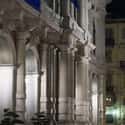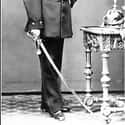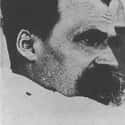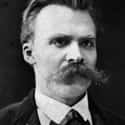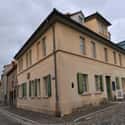-
(#4) In 1889, Nietzsche Had A Psychotic Break And Never Wrote Anything Again
On January 3, 1889, two policemen in the city of Turin, Italy approached a disturbance in the Piazza Carlo Alberto. They apprehended a man who had allegedly broken down after witnessing the flogging of a horse. The man was so overcome at witnessing this brutality that he ran up and threw his arms around the animal, attempting to stop the beating. He subsequently collapsed unconscious onto the pavement.
Identified as Friedrich Nietzsche, a German living in a nearby rooming house, his landlord was located and the afflicted man was carried back to his room. Although it would take days for Nietzsche's friends and relatives to become aware of his condition, the philosopher's mental prognosis would remain unchanged until his death in 1900, and he would not say or write anything intelligible for the rest of his life.
-
(#6) Nietzsche's Breakdown Was Diagnosed As Syphilis, Probably Contracted During The Franco-Prussian War
Although revisionist historians have sought out other explanations, at the time of his confinement in a mental asylum in 1890 after his mental breakdown, Nietzsche was diagnosed with third stage syphilis. This explains why, following his release into his mother's custody in 1890, nothing further was done to try to improve Nietzsche's condition, which was believed to be incurable and degenerative.
It is believed that the disease was contracted while Nietzsche served as a cavalryman during the Franco-Prussian War. Modern historians have attempted to explain Nietzsche's condition as the result of cancer or even various extremely rare neurological disorders.
-
(#12) Nietzsche Did Not Achieve Any Real Attention During His Lifetime
Friedrich Nietzsche's books sold poorly if at all during his lifetime, with the first printings of 500 to 1,000 copies occasionally selling out, and many of his books simply going out of print after their first publication. In fact, because of his views, which were crystallized in the statement "God is dead," some printers actually refused to print his manuscripts.
Additionally, during his academic career, his classes were sometimes poorly subscribed to due to his ideas being perceived as dangerously radical. Only toward the end of his life would his writings be examined, usually by other intellectuals and philosophers intrigued by his ideas concerning religion and Christianity.
-
(#3) Nietzsche Retired In His Thirties And Lived Out Of A Suitcase
For most of his life, Nietzsche was plagued by various maladies, both real and possibly imagined. He was most profoundly affected by incapacitating headaches, poor digestion, and nausea. The fact that he had extremely poor eyesight to the point of veritable blindness also did not help his constitution. These afflictions would frequently interrupt his professional life, and led to days of bed rest and isolation.
Finally, these chronic conditions forced Nietzsche to resign from his professor's chair on May 2, 1879. Through an intervention by the department chairman, he would go on to receive a pension equal to roughly two thirds of his annual salary for a period of six years. This would eventually be extended and would be paid to him up until 1897, when his sister Elizabeth requested it be halted. Nietzsche used this stipend to travel in a perpetual circle between southern France and Italy in the winter and Switzerland and Germany in the summer, living in rented rooms and boarding houses while working on a succession of manuscripts.
-
(#5) After Nietzsche's Breakdown, He Lived In His Mother's Attic
In his apartment, Nietzsche was sedated but continued to behave erratically, sending grandiose letters to Richard Wagner's wife, Cosima - with whom he had not communicated in years - and to his former teaching associates at the University of Basel, Franz Oberbeck and Jacob Burckhardt, and even to German chancellor, Otto von Bizmarck. These letters, known as the "Madness Letters" clearly indicated an unhinged mind. Prior to his breakdown, his landlady had heard him loudly playing the piano at night while dancing erratically in the nude.
Familiar with his professional contacts in Basel, Nietzsche's landlord contacted Franz Oberbeck, who came and managed to get Nietzsche back to Basel after a harrowing train ride. Nietzsche's mother, Franziska, then took custody of him and committed her son to an asylum at Jena, but eventually it was acknowledged that nothing could be done. Mute and with no ability to write coherently, Nietzsche lived in his hometown of Naumburg, Germany, on the third floor of his mother's home until her death in 1897.
-
(#10) An Initial Admirer And Confidant of Richard Wagner, Nietzsche Ultimately Became Estranged
Friedrich Ritschl was responsible for introducing Nietzsche to composer Richard Wagner while the three resided in the vicinity of Leipzig. Wagner was initially delighted by Nietzsche's favorable philosophical comparisons of his music to classical influences in Nietzsche's first book, The Birth of Tragedy. The young philosopher was invited to spend holidays with the composer and his mistress and eventual wife, Cosima, at the their Swiss villa at Tribschen, on Lake Lucerne.
But Wagner was also always looking for ways to increase his own success and mainstream popularity, and his egocentric personality, anti-Semitism, and use of Christian themes ultimately alienated Nietzsche. When Nietzsche's writings became unenthusiastic, Wagner and his wife distanced themselves, especially after he began his radical examinations of religion and Christianity. The two men would last see each other on November 5, 1876, and Wagner would die of a massive heart attack in 1883, having never spoken to Nietzsche again.
New Random Displays Display All By Ranking
About This Tool
Friedrich Nietzsche was the most famous philosopher and poet of the 19th century who had a great influence on the development of philosophy. H literature works have provided extensive criticism and discussion in the fields of religion, philosophy, and science, etc. At the age of 24, he already became a professor of classical literature in the German-speaking of the University of Basel, specializing in ancient Greek and Latin literature.
Unfortunately, he resigned due to health problems in 1879 and has been suffering from mental illness ever since, he breakdown in 1889 has never recovered. He firmly affirmed the value of humans and the importance of independent thinking but failed to overcome mental illness. The random tool introduced 12 details about his miserable but fascinating life.
Our data comes from Ranker, If you want to participate in the ranking of items displayed on this page, please click here.











